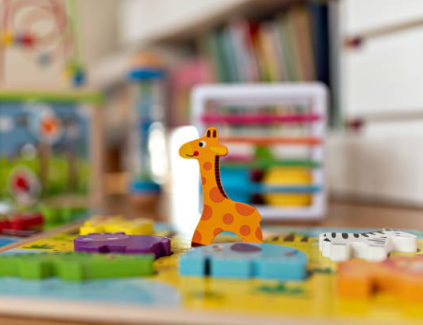The best age to start daycare is after the child’s first birthday. “Children at this age are making leaps and bounds in language, social and motor skills. The daycare center’s constant exposure to new friends and stimulating activities can meet the needs of young children for learning and exploration,” says Karen Miller, author of “Simple Steps”: Developmental activities for infants, toddlers, and two-year-olds.
However, although early childhood is ideal for transferring to daycare, parents may experience some problems. This is because young children still have baby-like qualities; They require constant supervision, have limited attention spans, and often suffer from separation anxiety.

Are you ready to start childcare? Check out these tips for finding the perfect place to live, then read how to prepare your child for the transition.
Choose a Nursery
Whether your child will be at the center or in a private residence, check that the facility is state licensed and has not been charged with any violations. You can search for high-quality early childhood programs on naeyc.org that are accredited by the American Association for the Education of Young Children (NAEYC).
Next, find out if the nursery you’re considering allows visits during business hours. This will give you an idea of how they work. Consider the following factors to choose the best daycare option for your family.
Safety features
When evaluating potential daycare centers, safety is your primary concern. Check for covered electrical outlets, fire extinguishers, smoke alarms, and first aid kits. You’ll also want to look for locked cabinets and age-appropriate toys. Any toy that has fragile parts or is smaller than the inside of a toilet paper roll is a choking hazard for children under 4 years of age.
Other safety issues discussed with potential daycare centers include:
- Ask about emergency plans in the event of fires, earthquakes, power outages, severe weather, etc., and how often these plans are drilled and revised.
- Ask about an open-ended policy about when you can visit your child during the day.
- Ask about protocols to prevent your child from being checked by strangers or people you don’t want to be near your child.
- Ask about their sickness policy and what to do if your child is sick.
Healthy food
Safety standards also apply to food. Growing toddlers must eat healthy snacks throughout the day, so ask to check the center’s meal schedule. It’s also important that any kitchen space for preparing or storing food is clean and safe from curious little hands. Ask if the kitchen area is child-friendly and ask where children eat and how these areas are kept clean.
Student-to-faculty ratio
The NAEYC recommends a maximum of 12 toddlers in a group, with a minimum of 6 adults for every 1 child. Ask the director if the children are supervised while they sleep. Perhaps the most important safety feature is constant adult supervision.
To learn more about group ratios, including your state’s regulations, check out the National Child Care Licensing Regulations Database.
Cleanliness of facilities
In daycare centers, cleanliness is also crucial. Before the age of 2, children’s immune systems are particularly susceptible to viruses. To prevent the spread of germs, daycare workers must rigorously wash their hands and those of their children, and keep eating, sleeping, and diaper changing areas clean and tidy.
Qualified employees
Toddler daycare is not a glamorous babysitting job. To get the most out of it, the toddler needs a caregiver who can play with him and challenge him to expand his skills. Look for a program that consists of teachers who have a degree in child development or a child development assistant certificate.
Age-appropriate courses
Ask the director if there will be a gradual focus on skill and language development as the child approaches 2 years of age. They should keep a record of diaper changes, nap times, and the child’s mood and activities. Lessons should provide regular learning opportunities through hands-on materials, exploration, and games. Young children learn math concepts by building blocks and counting toys, and gain early literacy skills through stories, songs, and finger games. Caregivers should encourage children to wear their own coats and eat their own meals.
When you visit a facility, pay attention to how the teacher engages the children in the game. If they don’t expose the kids to a rich and varied play experience, choose another center.

Prepare Your Child for Daycare
Once you’ve found the perfect childcare program for your child, you might think that the hard part is over. It’s a tough transition for a toddler – especially if it’s his first time away from home. Children at this age thrive on perseverance; Any major change in their daily life is prone to uneasiness. Some tears are natural, but there are some clear steps you can take to help them feel at ease.
Let them know what to expect
Before your first day, try reading picture books about going to daycare or school, such as Elizabeth Verdick’s Bye-Bye Time and Audrey Penn’s The Kissing Hand, and talk to your child about what to expect.
If your child is feeling anxious, try these tips:
- Make a trip to the daycare center so your child knows how they will get there.
- Ask them to help choose bags, clothes, and breakfast on the first morning.
- Practice saying goodbye and hugging together, or even saying hello when you get together.
- Ask the daycare center if your child can visit the daycare before the first day of school to learn about it and meet with staff.
- By giving your child some exercises and options, they may feel more excited and less nervous.
Easy access to the daycare center
Young children have a limited sense of the persistence of objects; When you leave your child at daycare, they may not fully realize that you will come back to pick them up later. So how can you ease their fears? Don’t let your baby give up all of a sudden. In the beginning, stay with him for as long as possible, even for a full day of a week or so. If possible, let them work part-time during the first week to allow them to gradually adjust to their new environment.
Stick to a routine
Pick-up times should be predictable, and try to establish a farewell ceremony. Be sure to give your child a brief overview of what they are doing in the morning.
Provide some comfort
Give your child a picture of you or a loved one to calm them down during the day. Most importantly, show your child that you like their caregiver and let them know that they will have a great time at the centre.
Face your own doubts
Finally, acknowledge that you may also have separation issues. It is difficult to give your child to someone else. But paying attention to the friends she will make and the pleasure she will have will make you both feel better about the experience.
